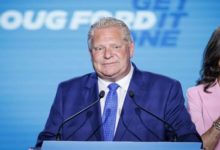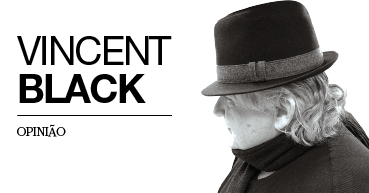‘Blame John Horgan’ billboard drives political blame game over gas prices
The political bickering over high gas prices has moved outside the walls of the B.C. Legislature and is now staring commuters directly in the face in the form of a billboard plastered next to a major thoroughfare in Metro Vancouver.
“Blame John Horgan,” reads a massive sign that’s impossible to miss for drivers crossing the Alex Fraser Bridge on Highway 91 in Delta.
So who’s paying for the ad? The B.C. Liberal caucus — and, in effect, you and me, as that money comes from a budgeted Legislative Assembly fund, not the party or donations.
“It’s outrageous; this is taxpayer money being used for partisan activities and that should not be allowed,” said Green Party Leader Andrew Weaver.
“It’s unacceptable and the public should be demanding they take them down for no other reason than they are using their money for partisan advertising.”
But the B.C. Liberals have no intention of backing off, according to Leader Andrew Wilkinson.
“We’re the official opposition, and our job is to present the case to British Columbians that they’re paying too much tax and that’s what we’re doing with those billboards.”
“We’re concerned that people need to know why they’re paying so much in gas, and a good chunk of it is because of provincial taxation,” he said.
Here’s a breakdown of the 35-cents a litre in provincial taxes drivers pay in Metro Vancouver:
- Motor fuel tax — 1.75 cents
- B.C. Transportation Finance Authority tax — 6.75 cents
- Carbon tax — 8.89 cents
- TransLink tax — 17 cents (increasing to 18.5 cents on July 1st)
Wilkinson is pushing the government cap some of those taxes in a bid to bring down prices.
His proposal would set a benchmark price and anytime it goes over it, the province would curtail taxes to prevent prices from exceeding the pre-determined amount.
But Wilkinson acknowledges the TransLink tax and the carbon tax should be left alone. That leaves only the motor fuel tax and the B.C. Transportation Finance Authority tax. Even if both were wiped away entirely, it would only amount to a savings of about 8.5-cents per litre.
‘It makes no economic sense’
An economist believes Wilkinson’s plan amounts to a subsidy for oil companies while leaving no significant benefit for drivers.
“It is a completely ineffective proposition — it makes no economic sense,” said Werner Antweiler, associate professor at UBC’s Sauder School of Business.
He argues that sacrificing taxes is a blatant invitation for oil companies to raise their prices even higher, knowing the government will absorb the difference.
“It really wouldn’t change the prices but it would boost the profits of oil companies while doing absolutely nothing for consumers,” he told CBC.
Premier brought this on himself?
When I put Wilkinson’s tax capping suggestion to the premier, he flipped it back on the Opposition.
“With the flick of a pen, the former Liberal government could’ve done a whole bunch of things to improve the quality of life for British Columbians,” Horgan said last week. “I think Mr. Wilkinson knows full well that these are complex issues.”
Maybe so, but they’re complex issues that may be a mess of the premier’s own making as he’s the one who has suggested multiple times he has the power to fix things.
“We’ll see how it goes through the summer and if there’s an opportunity to have the province step in and and help, we’ll do that,” Horgan told reporters in early April, one of many times he’s suggested a similar notion.
That perked up the ears of drivers in the Lower Mainland, anxiously awaiting his suggestions on what that “opportunity” might be.
They’re still waiting.
The Opposition has capitalized on his silence, using it as the prime debate topic in question period this week.
On Wednesday alone, the B.C. Liberals asked the NDP no fewer than 10 times to outline just one example of an option for the relief the premier alluded to. Their answer: “We’re working hard to make life more affordable for British Columbians.”
Weaver has chided both sides for trying to paint this as any one politician’s problem.
As for Horgan’s mystery solution, Weaver says the premier does have a few cents to play with in the form of provincial taxes — but otherwise, he’s relatively powerless to offer a significant fix.
“Sometimes, Mr. Horgan, I would suggest, says things without actually thinking through the ramifications of what he said. I think what he was doing was thinking out loud.”
‘You own the pipeline, get some gasoline into it’
The premier suddenly seems have come up with a new solution to the pain at the pumps: Ottawa.
“I will say directly to the prime minister himself …’you own the pipeline, get some gasoline into that pipeline so that we can relieve pressure in the Lower Mainland,'” Horgan said at Wednesday’s news conference.
He’s referencing the federal government’s purchase of the Trans Mountain pipeline last year, suggesting the federal government is responsible for getting more refined fuel to B.C.
At this point, it’s one of the only concrete ideas Horgan has put forward as he continues to proclaim supply issues are the problem.
Solution: ‘hang in there’
Weaver says the power lies in the hands of the consumer. And the consumer, he says, should stage a boycott.
“If we don’t play the game that the oil companies, through the price margin increases, are making us play, we should just say, ‘We’re not playing that.'”
How does one do that, exactly?
“Find alternate means: bike to work, drive with a friend, take public transit, shuffle your schedule slightly,” Weaver suggested.
“Just hang in there, prices are going to come down in the fall — they do after every summer driving season’s gouging.”
So, in theory, unless B.C. builds another refinery in the next three months or convinces Ottawa to pump more gasoline through the Trans Mountain pipeline or decides to go on a tax slashing spree, Weaver’s “ride-it-out” solution may be the only one available to drivers left helpless at the pump.







Redes Sociais - Comentários